Abstract
One of the priority tasks of Program for the Socio-Economic Development of the Russian Federation over the medium-term perspective is the development of small business as a market institution. Particularly, small business increases the demand for labor and contributes to the reduction of unemployment in the country. All this creates a state interest in the development of small business and support. In this regard, at present, one of the most important trends in the development of the economy is the accelerated development of small business. At the same time, the sustainability of small business development should be ensured through the formation of the entrepreneurial climate of the territory. This article presents the results of international and national expert assessments of the formation of the entrepreneurial climate in the Russian Federation, as well as the results of a study of business activity factors in the small business segment. Despite existing measures of support from the authorities and particularly according to the World Bank’s Doing Business rating, in the last 4 years Russia’s position in the rating improved from 92nd position to 35th position, there are still no optimal conditions for the development of small business in the country. The present-day conditions of entrepreneurship in the Russian Federation identified in the course of the study served as the basis for building a model for the sustainable development of small enterprises, which takes into account the specifics of the choice of a possible scenario for their further development.
Keywords: Entrepreneurial climatesmall businesssustainable development model
Introduction
In modern conditions, the main factors affecting the development of small business in the country include the conditions and factors emerging in the external environment. In this connection, small enterprises need adaptation measures that are adequate to the prevailing business conditions and more efficient management.
There is intensive research done on of small business development and their solution. In particular, Uruzbayeva (2016), on the basis of her research, proved a direct correlation between the prevailing business climate in the regions and quantitative indicators of small business development. Morkovina (2016) believes that Russia needs not only economic growth, but also the growth of a certain quality associated with the development of small business.
Features of the formation of an entrepreneurial climate in the Russian Federation are reflected in the integrated rating indicators based on the results of studies of foreign and national experts.
Problem Statement
The most popular and objective international analytical assessments in this area are Index of Economic Freedom, Global Competitiveness Index, Global Innovation Index. Experts have developed their own list of indicators for each index. Moreover, this list can be updated and supplemented annually. The figure
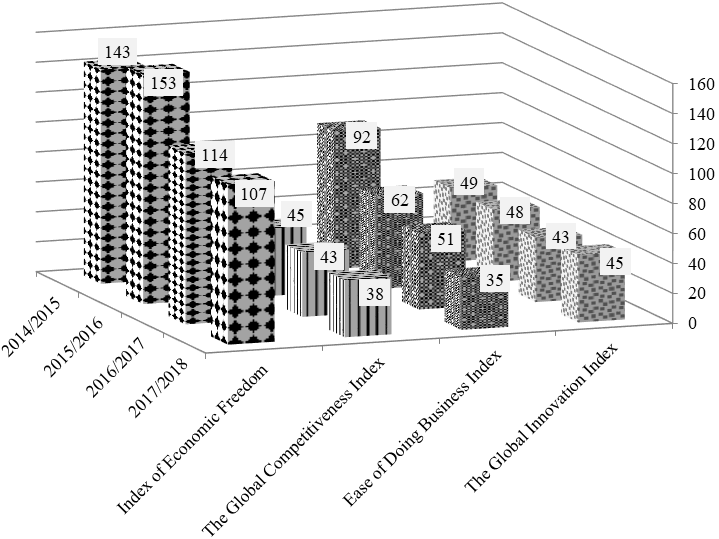
1. Index of Economic Freedom (Gwartney, Lawson, & Hall, 2018) is a combined index and accompanying rating, evaluating the level of economic freedom in the countries of the world.
According to the interpretation of the obtained values of the indicators over the past four years, Russia, according to experts, is a country with a predominantly non-free economy. However, the growth rate of the complex indicator allows predicting a favorable development. Compared to last year’s version of the ranking, the average score increased by 1.1 percentage points (hereinafter – pp) and reached 58.2 pp in the current year, which was the maximum indicator for the country in history. According to experts, the situation in the field of taxation and trade has improved most noticeably. The decline in indicators was recorded only in the sphere of financial well-being of the state (minus 5.7 pp) and bona fides of the authorities (minus 0.1 pp) (Index of Economic Freedom, 2018).
2. Global Competitiveness Index is calculated according to the methodology of the World Economic Forum. The rating defines national competitiveness as the ability of a country and its institutions to ensure stable economic growth rates that would be stable in the medium term.
Last year, Russia ranked 43rd in this rating, rising from 45th place. This year the result has been improved by another 5 positions. The absolute rating increased from 4.5 to 4.6 (Schwab, 2017).
3. Global Innovation Index is a global study and accompanying rating of countries of the world in terms of the level of innovation development. Describing the position of Russia in this rating, one should note a spasmodic dynamics (Figure
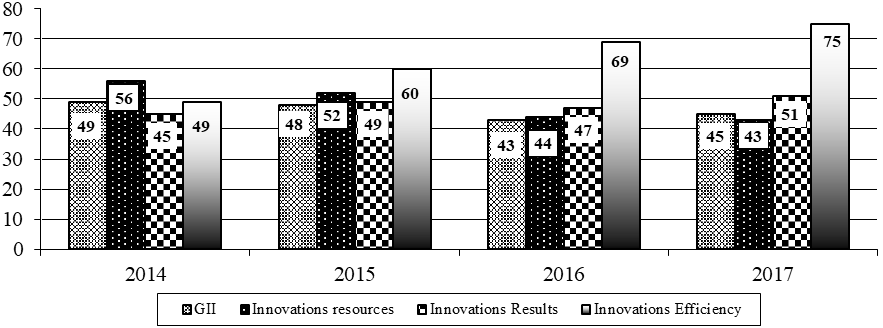
On the basis of the data presented in Figure
In the new ranking of 2017, Russia ranks 45th, dropping 2 positions compared with last year. Among the 35 leading European countries Russia ranks 31st.
4. Ease of Doing Business Index allows assessing the country’s position in the ranking of favorable conditions for doing business. Since 2014, Russia has risen by 57 points in the ranking (Doing Business, 2018).
In the current year, in comparison with the previous period, Russia has improved its position by five points, taking 35th place (Figure

Evaluating the dynamics of the position of the Russian Federation on key rating indicators, one could note a steady upward movement in terms of registering a company (from 88th position in 2014 to 26th position in the current year), obtaining a building permit (from 178th to 115th position of rating), protecting investor rights (from 115th to 53rd position), taxation (from 56th to 45th position) (figure
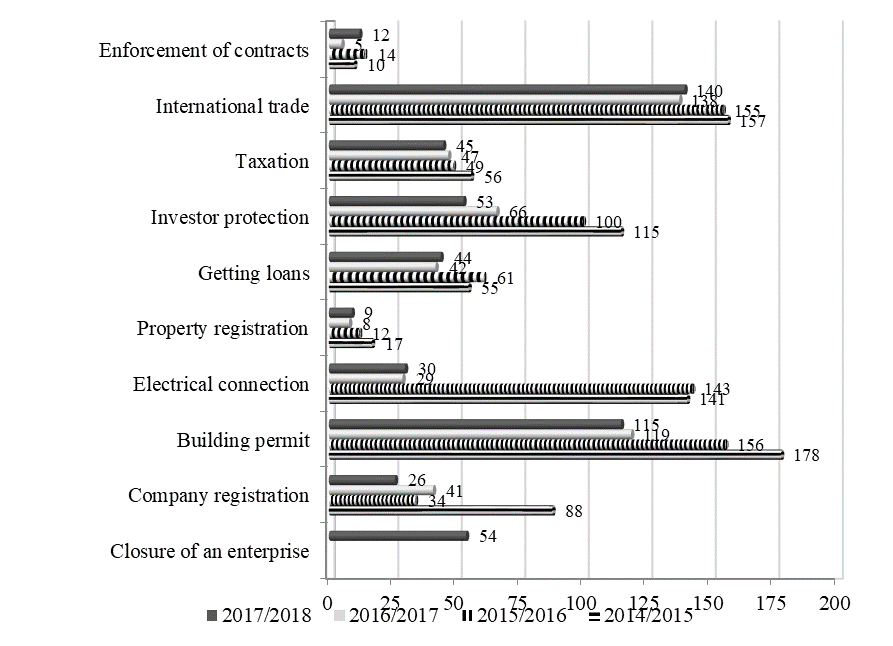
Thus, the World Bank has noted such key changes related to the business climate in the Russian Federation as simplifying the registration of new companies, simplifying and cheapening the process of connecting to power grids and reducing tariffs for technological connection, reducing the time for state registration of rights to real estate and transactions with it, reducing aggregate tax rate by excluding movable property from the taxable base for corporate property tax.
1.2. National research on the entrepreneurial climate in the Russian Federation
For a multilateral assessment of the characteristics of the formation of the entrepreneurial climate in the Russian Federation, we consider the results of national research presented by the Analytical Center for NAFI (Figure
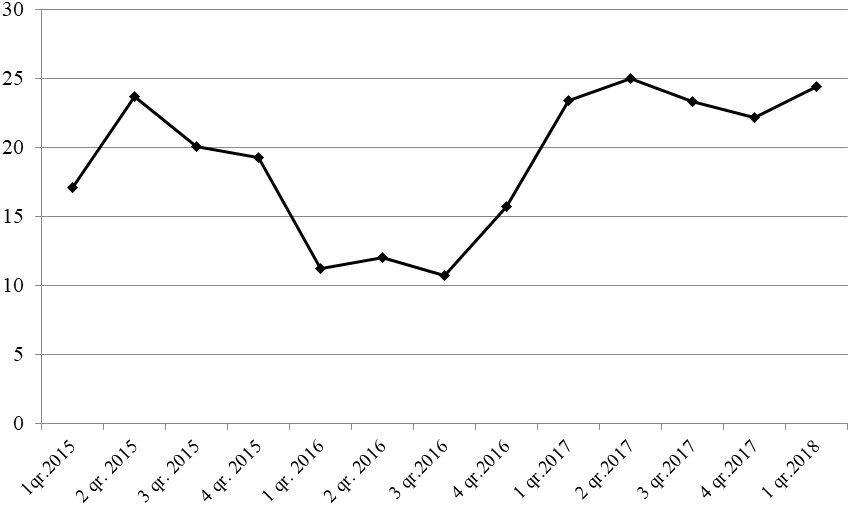
At the end of the 1st quarter of 2018, the NAFI Business Climate Index was 24.4 pp, that is 2.2 pp. higher than in the 4th quarter of 2017 and by 1.1 percentage points higher than in the 3rd quarter of 2017 (NAFI, 2018).
At the same time, in the current year, 39% of Russian entrepreneurs estimate the financial position of their business as “good” or “very good”: the share of entrepreneurs who adhere to this point of view has not changed since October 2016. 41% of respondents consider the company’s financial situation as “average” and only 15% give negative evaluations.
Since July 2017, the forecasts of entrepreneurs became more optimistic, the share of those who found it difficult to forecast was significantly reduced (9%, a decrease by 13 pp compared with January 2018), 43% of companies in the future expect an improvement in financial position, 38% believe that the company’s financial situation will not change, 10% expect a deterioration in the situation.
2. Problem Statement
2.1. Small business structures’ activity and problems of small business development in Russia
Currently, more than 5.7 million small and medium-sized enterprises (SMEs) operate in the Russian Federation, including 2.7 million legal entities and almost 3 million individual entrepreneurs (IP). It should be noted that the share of the small and medium-sized enterprises in the country’s GDP is about 20 %. According to statistics, virtually every fourth worker is engaged in small and medium-sized businesses. Analyzing the activity of small business structures, one should take into account regional differences that have a significant impact on the business environment. This explains the fact that even in the neighboring regions, the conditions for business can vary considerably (Golikova & Kuznetsov, 2017).
The indicator of business activity in the small business segment is the Russia Small Business Index (RSBI) (Figure
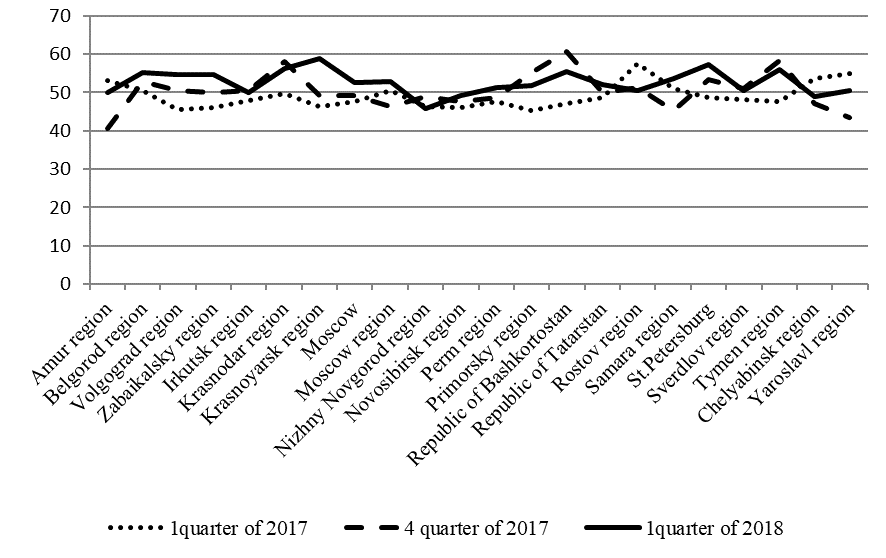
The results of the study showed that in the 1st quarter of 2018 compared to the 4th quarter of 2017, business activity in the regions improved markedly. Only in three of 24 analyzed regions, the index is below 50 p., a quarter before there were 12 such regions. In general, the value of the RSBI index over the last year increased from 48.8 to 53.2. At the same time, considering this index by components, it is reasonable to note that in the 1st quarter of 2018, the number of people indicating improvements in business conditions did not change, but remains at relatively high levels (17%). The share of entrepreneurs who are passive in the matter of investment has declined markedly and is 64%. The finance availability index also showed a slight increase (Index RSBI: Compass of Micro, Small and Medium Businesses, 2017).
In general, analyzing the conditions for conducting business activities of small and medium-sized businesses in the Russian Federation in 2015-2017, improvements should be noted, in particular:
a noticeable reduction in the administrative burden on small businesses as a result of the development and practical application of a risk-based approach in control and supervisory activities;
increase in availability of financial resources. Since 2015, the Institute of SME Development has been functioning, which to this day is actively implementing loan and guarantee support;
one of the measures to expand the access of small and medium-sized enterprises to government procurement and procurement of the largest state-owned companies is the establishment of an 18% quota;
active application of the principles of project management in supporting and developing small and medium-sized businesses, developing and implementing target models in the regions;
approval of the Standard for the Development of Competition in the Regions (valid since 2015);
distribution and implementation of the best regional practices throughout the country in accordance with the “roadmap” for the implementation of the “Strategy for the Development of Small and Medium-Sized Businesses in the Russian Federation for the Period up to 2030”.
Despite significant improvements in the business activity of the small sector of the economy and the intensification of state support measures, today the following problems of small business development in the Russian Federation remain relevant (Bondarenko, 2013; Vilenskiy & Sgem, 2014):
imperfection of the legislative base;
imperfection of financial and credit mechanisms;
imperfection of taxation;
administrative barriers.
2.2. Modeling sustainable development of small business in Russia
Considering the current trends in the formation of the entrepreneurial climate in the Russian Federation, let us turn to the issue of modeling the sustainable development of small business in the context of the dynamic acquisition of a new quality by a small business structure (Figure
A significant role in shaping the conditions for the development of small business is assigned to the state.
The key measures of state support for small businesses, aimed at solving urgent identified problems, are providing access to real estate; connection to networks, including transparency in setting fees and terms for acceding to standards of contracts; subsidizing the cost of interconnection for small businesses; the expansion of the practice of forming financial guarantees, the development of microfinance institutions, concessional lending, reduction of administrative barriers; expansion of access of small enterprises to public procurement, including the establishment of quotas; special tax regimes for small businesses.
The obtained values of the indicators, as well as the study of the prevailing conditions of the business climate in the country, are the starting point for the formation of a possible scenario for the development of small business.
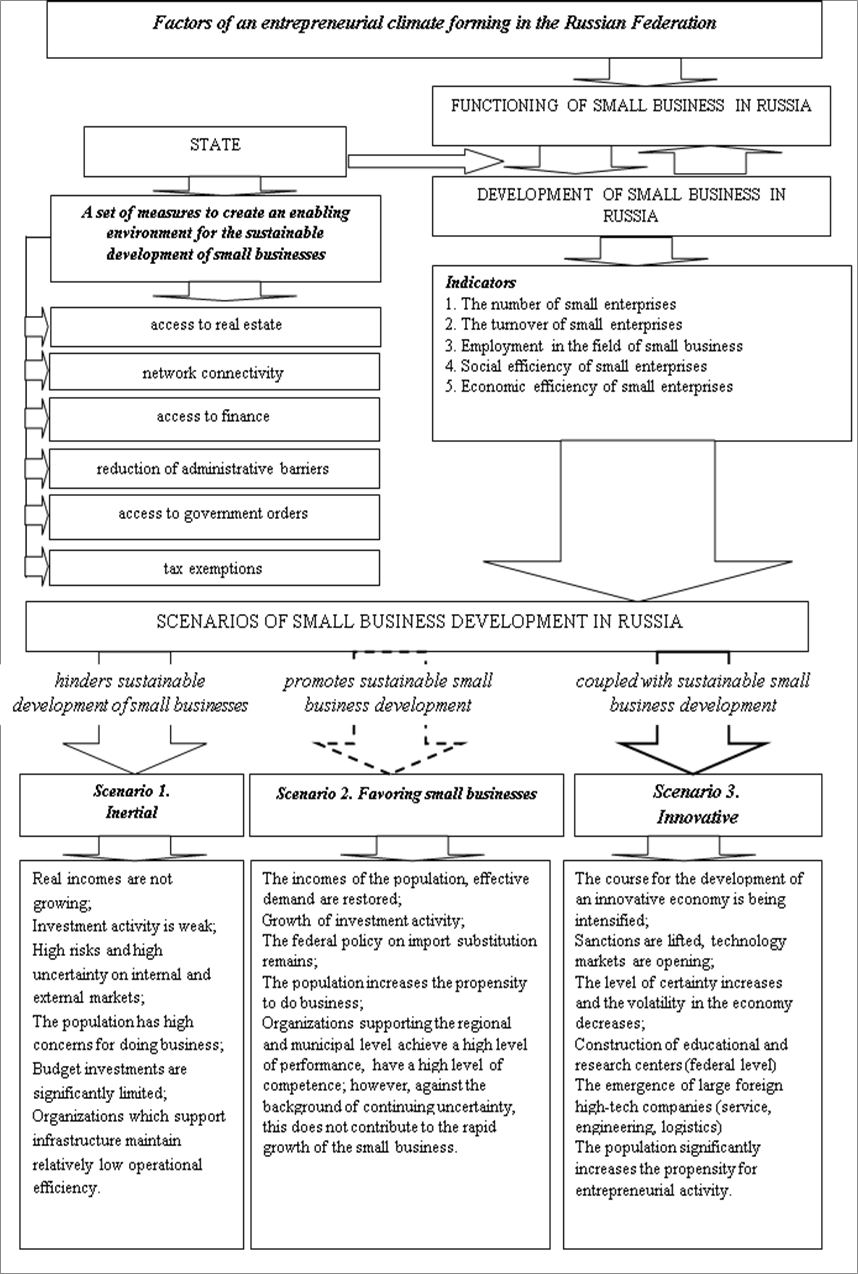
It should be noted that the sustainable development of small business is mostly associated with an innovative development scenario involving the integrated development of the small business sector and support for innovative activity.
Research Questions
1. International rating assessments of the business climate in the Russian Federation.
2. National business climate research in the Russian Federation.
3. Evaluation of business activity of small business structures in the Russian Federation.
4. Identification of problems of small business development in Russia.
5. Development of a model for the sustainable development of small business in Russia;
Purpose of the Study
The purpose of the study is to analyze the conditions of entrepreneurship and develop a model for the sustainable development of small business in the Russian Federation.
The objectives of the study are:
systematization of international and national rating assessments of the business climate in the Russian Federation;
analysis of the conditions of entrepreneurship and the determination of the rating position of Russia;
conducting assessment of the business activity of small business structures in the Russian Federation and the identification of problems of small business development;
constructing a model of sustainable development of small business, taking into account the particularities of the choice of a possible scenario for their further development.
Research Methods
Systematization of international and national rating assessments of the business climate, as well as a study of the business activity of small business structures in Russia and the development of a model for their sustainable development were carried out using the system method, the method of statistical research, the rating method, the comparative analytical method and the method of graphical modeling.
Findings
An assessment of the characteristics of the formation of the entrepreneurial climate in the Russian Federation, based on objective data from international and national experts, revealed significant improvements in Russia’s position in the world rankings. The largest positive trends were noted in relation to the rating of the Ease of Doing Business Index, according to which, in the period from 2012 to this year, Russia rose in the rating by 85 points, from the level of Nicaragua to the level of the most developed countries in the world.
However, the factors that reduce the rating position of the country are also noted, in particular, the financial well-being of the state and the integrity of the government (Index of Economic Freedom), the sub-index of the results of innovation (The Global Innovation Index), obtaining loans, enforcing contracts and international trade (Ease of Doing Business Index).
According to analytical data from the national agency NAFI, the main reasons for the difficulties that entrepreneurs in Russia face today are high taxes, tariffs, insurance premiums and non-tax payments, as well as reduced demand for goods and services, high competition with the shadow sector, administrative barriers and difficulties in obtaining loans.
At the same time, the small business sector in the Russian Federation, according to the RSBI assessment indicator, shows positive trends in development, in particular, improved business conditions and increased availability of financing.
However, there are also negative factors in the development of small business: the investment activity of a small business has slowed its growth, a reduction in revenue and the passivity of small business in matters of recruitment.
The main problems faced by small enterprises in the Russian Federation include difficulties arising during registration and opening a business, lack of qualified personnel and production bases, low legal security, administrative barriers, insufficient loans.
Despite state support measures, there are still no optimal conditions for the development of small business in Russia.
As a tool to ensure the sustainable development of small businesses, a model has been proposed, based on development scenarios which take into account the existing conditions of entrepreneurship.
Conclusion
Small business contributes to the acceleration of economic growth of the state, diversification, implementation of innovations, positive growth dynamics of economic indicators, development of competition and economic restructuring, and creating additional jobs due to the fact that small business structures are more resistant to changes in the external environment because of their rapid adaptation to current market conditions.
In the current conditions of doing business, a positive shift towards the sustainable development of small businesses in the Russian Federation is possible only with a competent, balanced economic policy and close dialogue between the state and entrepreneurs, which is reflected in the issue of modeling the development of small structures.
In order to expand the provision of support measures to small businesses in the Russian Federation, it is necessary to provide for:
-development and implementation of “package support measures”;
-development of innovation infrastructure to support entrepreneurship;
involvement of labor resources in the small business sector;
possibility of creating cluster / industry associations
References
- Bondarenko, V. E. (2013). Criteria for determining the sustainable development of entrepreneurial structures in the context of improving the system of financial regulation of the region. Terra Economicus, 11(4), 182-186.
- Doing Business (2018). A World Bank Group Flagship Report. Received July 16, 2018, from https:// http://www.doingbusiness.org/content/dam/doingBusiness/media/Annual-Reports/English/ DB2018-Full-Report.pdf.
- Golikova, V., & Kuznetsov, B. (2017). Suboptimal Size: Factors Preventing the Growth of Russian Small and Medium-Sized Enterprises. Foresight and STI Governance, 11(3), 83-93. DOI:
- Gwartney, J., Lawson, R., & Hall J. (2018). Economic Freedom of the World. Received September 15, 2018 from https://www.fraserinstitute.org/studies/economic-freedom.
- Index of Economic Freedom (2018). Russia. Received July 1, 2018, from https:// www.heritage.org/index/country/russia.
- Index RSBI: Compass of Micro, Small and Medium Businesses. (2017). Received September 21, 2018 from https://opora.ru/upload/iblock/889/ 8895a6497e1abe545abbc801b9b9efb2.pdf.
- Morkovina, S. S. (2016). Innovative mechanisms to improve business climate in the regions of the Russian Federation as precondition for international business development. Globalization and Its Socio-Economic Consequences, 16th International Scientific Conference Proceedings, I-V, 1435-1443.
- NAFI. (2018). Business climate index has grown. Received September 21, 2018, from https://nafi.ru/analytics/indeks-delovogo-klimata-vyros/.
- Science. Technology. Innovation. (2016). Russia in the global innovation index-2016. Received July 15, 2018, from https://issek.hse.ru/data/2016/08/15/1117964142/NTI_N_12_15082016.pdf.
- Schwab, K. (2017). The Global Competitiveness Report 2017-2018. Received September 11, 2018 from https://www.weforum.org/reports/the-global-competitiveness-report-2017-2018.
- Uruzbayeva, N. A. (2016). Problems and ways to improve the business climate in the regions. Economy of the Region, 12(1), 150-160. DOI:
- Vilenskiy, A., & Sgem. (2014). Features and support of small and medium-sized enterprises (SME) in Russia. Political Sciences, Law, Finance, Economics and Tourism, 4, 273-278. DOI:
Copyright information

This work is licensed under a Creative Commons Attribution-NonCommercial-NoDerivatives 4.0 International License.
About this article
Publication Date
02 April 2019
Article Doi
eBook ISBN
978-1-80296-058-7
Publisher
Future Academy
Volume
59
Print ISBN (optional)
-
Edition Number
1st Edition
Pages
1-1083
Subjects
Business, innovation, science, technology, society, organizational theory,organizational behaviour
Cite this article as:
Parshutina, I., Plakhova, L., Zakharkina, N., Sokolova, N., & Isakova, M. (2019). Formation Of Entrepreneurial Climate In Russia For Sustainable Development Of Small Business. In V. A. Trifonov (Ed.), Contemporary Issues of Economic Development of Russia: Challenges and Opportunities, vol 59. European Proceedings of Social and Behavioural Sciences (pp. 142-152). Future Academy. https://doi.org/10.15405/epsbs.2019.04.16

